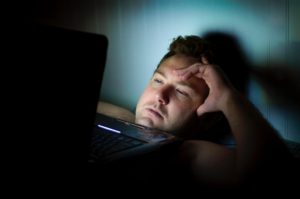Ask Mr. Pedometer and Friends…
March 13, 2019
Q: Mr. Pedometer, you encourage us to “sleep well,” but that seems to be a more elusive goal with each year of my age. Any suggestions?
A: AARP Bulletin for March 2019 states, “More than one-third of adults aren’t getting the recommended 7-plus hours [of sleep] per night needed to support good health,” so you can see that you are not alone in grappling with this problem. The article by Jessica Migala also warns that “the number of health conditions linked to poor or inadequate sleep is almost endless, with obesity, diabetes, and heart disease topping the list.”
What can help? Here are some of the suggestions she lists (paraphrased):
-
“BLUE-LIGHT INSOMNIA”
– The blue light that our electronic devices emit
 “suppresses melatonin, a sleep-inducing hormone.” Turning off these devices – including TV – one to four hours before bedtime can help, according to Karl Doghramji, MD, director of Jefferson Sleep Disorders Center in Philadelphia. If you cannot do without bedtime TV, he suggests wearing a pair of glasses that block the blue rays, which you can find from online retailers.
“suppresses melatonin, a sleep-inducing hormone.” Turning off these devices – including TV – one to four hours before bedtime can help, according to Karl Doghramji, MD, director of Jefferson Sleep Disorders Center in Philadelphia. If you cannot do without bedtime TV, he suggests wearing a pair of glasses that block the blue rays, which you can find from online retailers. -
“STEALTH CAFFEINE INSOMNIA”
– Okay, so you know that afternoon coffee might interfere with nighttime sleeping, but “people often have no idea that they’re consuming caffeine in other forms, like iced tea or chocolate,” says Beth Ann Malow, MD, director of the sleep disorders division of the Vanderbilt University Medical Center in Nashville. She suggests cutting off all forms of caffeine after lunch.
-
“NAP INSOMNIA” – If you find yourself dozing off – particularly between 2:00-3:00 p.m. – you may not feel sleepy at bedtime, leading to lying awake. Doghramji suggests scheduling something active for when you experience a dip in energy. That can refresh you for the rest of the afternoon and also help you sleep better that night.
-
“ALCOHOL-INDUCED INSOMNIA”
– This one may seem counter-intuitive, if sipping a glass of wine seems to relax you. Researchers have noted that although alcohol may make it easier to fall asleep, by the second half of the night, that sleep is “lighter and more fragmented,” leaving a person feeling less refreshed in the morning. Stop drinking alcohol three hours before bedtime and follow the guidelines of the Center for Disease Control and prevention: only one drink for women and only two for men.
For the full article, including other tips for getting a good night’s sleep, visit AARP.org/bulletin.